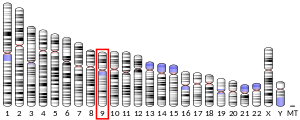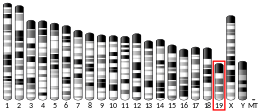Protein-coding gene in the species Homo sapiens
Phosphoserine aminotransferase (PSA) also known as phosphohydroxythreonine aminotransferase (PSAT) is an enzyme that in humans is encoded by the PSAT1 gene .[5]
The protein encoded by this gene is likely a phosphoserine aminotransferase , based on similarity to proteins in mouse, rabbit, and Drosophila Alternative splicing of this gene results in two transcript variants encoding different isoforms .[5]
Clinical significance Homozygous or compound heterozygous mutations in PSAT1 cause Neu–Laxova syndrome [6] [7]
See also References
^ a b c GRCh38: Ensembl release 89: ENSG00000135069 – Ensembl , May 2017^ a b c GRCm38: Ensembl release 89: ENSMUSG00000024640 – Ensembl , May 2017^ "Human PubMed Reference:" . National Center for Biotechnology Information, U.S. National Library of Medicine .^ "Mouse PubMed Reference:" . National Center for Biotechnology Information, U.S. National Library of Medicine .^ a b "Entrez Gene: phosphoserine aminotransferase 1" . Retrieved 2011-08-30 .^ Acuna-Hidalgo R, Schanze D, Kariminejad A, Nordgren A, Kariminejad MH, Conner P, Grigelioniene G, Nilsson D, Nordenskjöld M, Wedell A, Freyer C, Wredenberg A, Wieczorek D, Gillessen-Kaesbach G, Kayserili H, Elcioglu N, Ghaderi-Sohi S, Goodarzi P, Setayesh H, van de Vorst M, Steehouwer M, Pfundt R, Krabichler B, Curry C, MacKenzie MG, Boycott KM, Gilissen C, Janecke AR, Hoischen A, Zenker M (2014). "Neu-Laxova syndrome is a heterogeneous metabolic disorder caused by defects in enzymes of the L-serine biosynthesis pathway" . Am. J. Hum. Genet . 95 (3): 285–93. doi :10.1016/j.ajhg.2014.07.012 . PMC 4157144 PMID 25152457 . ^ Hart CE, Race V, Achouri Y, Wiame E, Sharrard M, Olpin SE, Watkinson J, Bonham JR, Jaeken J, Matthijs G, Van Schaftingen E (2007). "Phosphoserine aminotransferase deficiency: a novel disorder of the serine biosynthesis pathway" . Am. J. Hum. Genet . 80 (5): 931–7. doi :10.1086/517888 . PMC 1852735 PMID 17436247 .
Further reading
Vié N, Copois V, Bascoul-Mollevi C, Denis V, Bec N, Robert B, Fraslon C, Conseiller E, Molina F, Larroque C, Martineau P, Del Rio M, Gongora C (2008). "Overexpression of phosphoserine aminotransferase PSAT1 stimulates cell growth and increases chemoresistance of colon cancer cells" . Mol. Cancer . 7 : 14. doi :10.1186/1476-4598-7-14 PMC 2245978 PMID 18221502 . Basurko MJ, Marche M, Darriet M, Cassaigne A (1999). "Phosphoserine aminotransferase, the second step-catalyzing enzyme for serine biosynthesis" . IUBMB Life . 48 (5): 525–9. doi :10.1080/713803557 PMID 10637769 . S2CID 22449373 . Baek JY, Jun DY, Taub D, Kim YH (2003). "Characterization of human phosphoserine aminotransferase involved in the phosphorylated pathway of L-serine biosynthesis" . Biochem. J . 373 (Pt 1): 191–200. doi :10.1042/BJ20030144 . PMC 1223456 PMID 12633500 . Ozeki Y, Pickard BS, Kano S, Malloy MP, Zeledon M, Sun DQ, Fujii K, Wakui K, Shirayama Y, Fukushima Y, Kunugi H, Hashimoto K, Muir WJ, Blackwood DH, Sawa A (2011). "A novel balanced chromosomal translocation found in subjects with schizophrenia and schizotypal personality disorder: altered l-serine level associated with disruption of PSAT1 gene expression" . Neurosci. Res . 69 (2): 154–60. doi :10.1016/j.neures.2010.10.003 . PMC 3049551 PMID 20955740 . Misrahi M, Atger M, Milgrom E (1987). "A novel progesterone-induced messenger RNA in rabbit and human endometria. Cloning and sequence analysis of the complementary DNA". Biochemistry . 26 (13): 3975–82. doi :10.1021/bi00387a035 . PMID 3651428 .
External links Overview of all the structural information available in the PDB for UniProt : Q9Y617 PDBe-KB .
Activity Regulation Classification Kinetics Types



